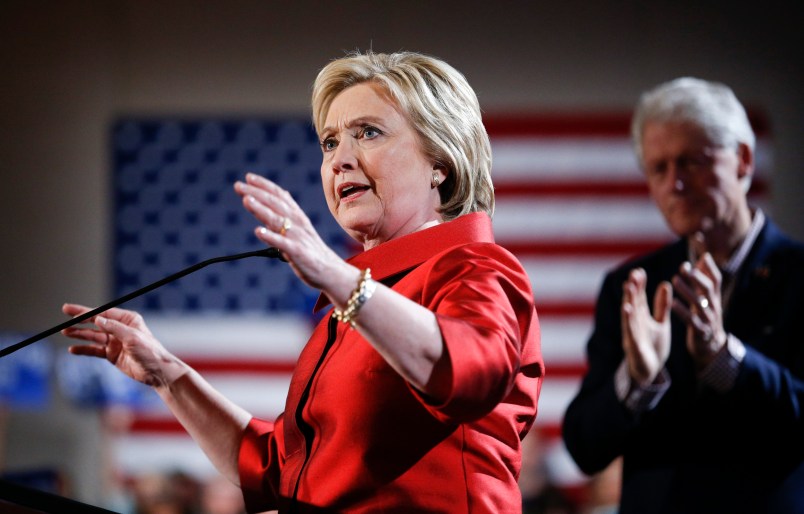Former Secretary of State Hillary Clinton defeated Sen. Bernie Sanders in Saturday’s Nevada caucus Saturday, a crucial win for the former first lady as she seeks to prove that she has a broader appeal in diverse electorates than the democratic socialist from Vermont.
“Americans are right to be angry, but we are also hungry for real solutions,” Clinton said Saturday night during her victory speech.
To everyone who turned out in every corner of Nevada with determination and heart: This is your win. Thank you. -H
— Hillary Clinton (@HillaryClinton) February 20, 2016
Clinton invested heavily in the state, having lost in the 2008 caucus to then-Sen. Barack Obama (she did win more state delegates then however). Her campaign set up shop there last April and the state was site of one of her first major appearance as a candidate.
Clinton thanked that broad coalition of supporters she had built from “hotel and casino workers who never wavered” to “students with too much debt” to “small business owners who never go off the clock.”
“This is your campaign, and it is a campaign to break down every barrier that holds you back,” Clinton said. “We’re going to build ladders of opportunity in their place so every American can go as far as your hard work can take you.”
Sanders was playing catch up when he started mobilizing in the state in November, and he hit a series of road bumps along the way. Nevertheless, heading into the race the polls between the two began to tighten.
Going into election day, Clinton was leading Sanders 49 percent to 46 percent in the TPM PollTracker Average.
The final days before the caucus became a mad dash between the two candidates to shore up support, particularly among Nevada’s Latino community, which makes up about a quarter of the state’s population. Clinton made bold statements about immigration — promising that she would push reform legislation in her first 100 days in office — at Thursday’s MSNBC town hall. Both campaigns also trotted out the endorsements they received from activists from the immigration reform movement.
Unions also played a major role in get out the vote efforts. While Clinton has snagged the endorsement of some prominent national unions, the state’s biggest player, the culinary workers union Local 226, opted to not take sides in the Democratic primary. (In 2008, the culinary workers endorsed Obama) Sanders, meanwhile, got in trouble with Local 226 when campaign operatives were caught posing as union reps to gain access to workers.
The pressure was on Clinton to win the state because its diverse electorate was supposed to act as a firewall to head off Sanders’ momentum coming out Iowa, where he essentially tied with Clinton, and New Hampshire, where he won in a landslide. Sanders’ strong performance in the state—which has a large Latino electorate, but also sizeable Asian and black populations—may mean Clinton will be vulnerable in the primary states that follow, where her campaign had argued she could count on minority voters.
“We are in this together,” Clinton said making her appeal to a diverse group of constituents. “We look at our country and see so much that is not working the way it should. We see grandparents forced to choose between paying rent and buying medicine…we see African American families denied mortgages…we see small towns and rural communities hallowed out by lost jobs and lost hope.”
Because Nevada is a difficult state to poll and has hosted only one Democratic early state caucus before, Saturday’s results were relatively unpredictable when compared to the more established contests in New Hampshire and Iowa.
The terrain doesn’t get any easier for Sanders as the race heads to next Saturday’s primary in South Carolina, where less than half of the Democratic electorate was white in 2008. Clinton has counted African Americans as among her strongest supporters, and recently received the endorsements of Rep. James Clyburn (D-SC) and the PAC for the Congressional Black Caucus.







phew…
What the hell? I’m reading this from California, and it’s currently 2:24 p.m. here. Why would you post this for East Coasters when there must still be ongoing voting being done in Nevada? Do you think we can’t see it?
Indeed!!..The Obama Coalition is back on its heels
Hill yeah!!!
A close win is a win. Whew.
This is the beginning.
[Standard Disclaimer: This commenter wishes it to be known that in November he or she plans to vote for the Democratic nominee, whoever that turns out to be, and will encourage their fellow primary candidate supporters to do likewise.]